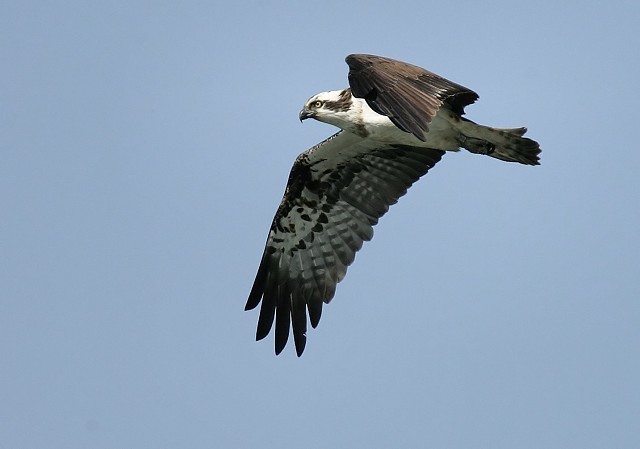Osprey missing feared shot in Rutland
Staff from Anglian Water and the Rutland Osprey Project fear that an Osprey has been shot in Rutland.
Last April two male Ospreys disappeared in suspicious circumstances from nests close to the reservoir. Now a third male, known as 08(97), has gone missing from the same area in southwest Rutland. The missing bird was the first to return to the site from its African wintering grounds after being released in Rutland, as part of the Rutland Osprey Project. The Project is a partnership between Anglian Water and the Leicestershire & Rutland Wildlife Trust to re-establish a breeding population of the birds in England.
Project Officer Tim Mackrill said: "We have not seen 08 since Wednesday 11th May. His mate is currently incubating a clutch of three eggs and so it is extremely rare for him to be away from the nest for more than a few hours. For us not to have seen him since 11th May is very worrying. It is extremely unusual for an apparently healthy male Osprey to vanish at this stage of the breeding season. The most likely explanation is that he has been shot, especially given that 08 hunts in the same area as the birds that disappeared last spring."

Osprey, Rutland Water, Leicestershire and Rutland (Photo: Ben the Plumber)
PC 1742 Laurie Appleton, from Leicestershire and Rutland Police, said: "Ospreys are protected as a Schedule One species under the Wildlife and Countryside Act, 1981, meaning it is an extremely serious offence to intentionally harm or kill them. We would appeal to anyone with any information to get in touch as soon as possible. We are taking this matter extremely seriously and will be carrying out further investigations this week."
Another possibility is that the Osprey may have become tangled in netting. Tim Mackrill said: "When fishing is difficult at Rutland Water the birds often turn their attention to other more sheltered lakes and ponds for fishing. We would be very grateful if anyone owning a pond, particularly those covered with nets, could check the margins for the bird. Ospreys have died in Scotland in this way in the past. If so, then this is a tragic accident, but we do need to know what has happened to this bird."
With 08 absent from his nest his mate, known as 5N, has been forced to incubate the eggs alone. Tim Mackrill said: "Male Ospreys usually do about a quarter of incubation duties and so 5N is having to do far more than usual. More significantly, females are dependent on their mate for food during the breeding season, and so 5N went without fish for at least three days. On Saturday we put a fish close to the nest and 5N eagerly accepted this. We will continue to put fish out for her this week, but the situation is clearly far from ideal."

Osprey, Rutland Water, Leicestershire and Rutland (Photo: Matt Williams)
08 is a very significant bird for the Rutland Osprey Project. He was the first Osprey translocated to the reservoir to return, in May 1999. He raised chicks at a nest on the nature reserve in 2007, before moving to a nest site on private land in 2009. Rutland Water Nature Reserve Manager, Tim Appleton, said: "Thousands of people have followed 08's progress over the past 13 summers and we are all extremely saddened at his disappearance. His return in May 1999 was the first indication that our ground-breaking project was going to work and so his loss is devastating for everyone involved in the project — staff, volunteers and visitors alike."
The disappearance of 08 is a reminder that persecution remains a very real threat to birds of prey in the UK. Roy Dennis, a world renowned expert on Ospreys who was instrumental in setting up the Project, said: "Ospreys became extinct in the UK as a direct result of human persecution. We thought that in today's more enlightened times that it would be far less of a threat to Ospreys, particularly in England, but the disappearance of the three birds in Rutland shows that this is far from the case. The project at Rutland Water has a huge amount of support and should result in Ospreys becoming a common sight again throughout the southern part of Britain. It is unacceptable that a few misinformed individuals could pose a real threat to their future spread."
The project team is now appealing for anyone with information to contact them. Tim Mackrill added: "The vast majority of people in Rutland are thrilled to have this rare and very special bird breeding in the county. It is terrible to think that the actions of perhaps one or two people threaten the future of Ospreys in our area. We would be very grateful for any information that might help us find out what happened to 08."
Anyone with any information should phone Leicestershire police on 0116 222 2222 or phone 01572 737 378 and ask for Tim or another member of the Osprey Project team.

